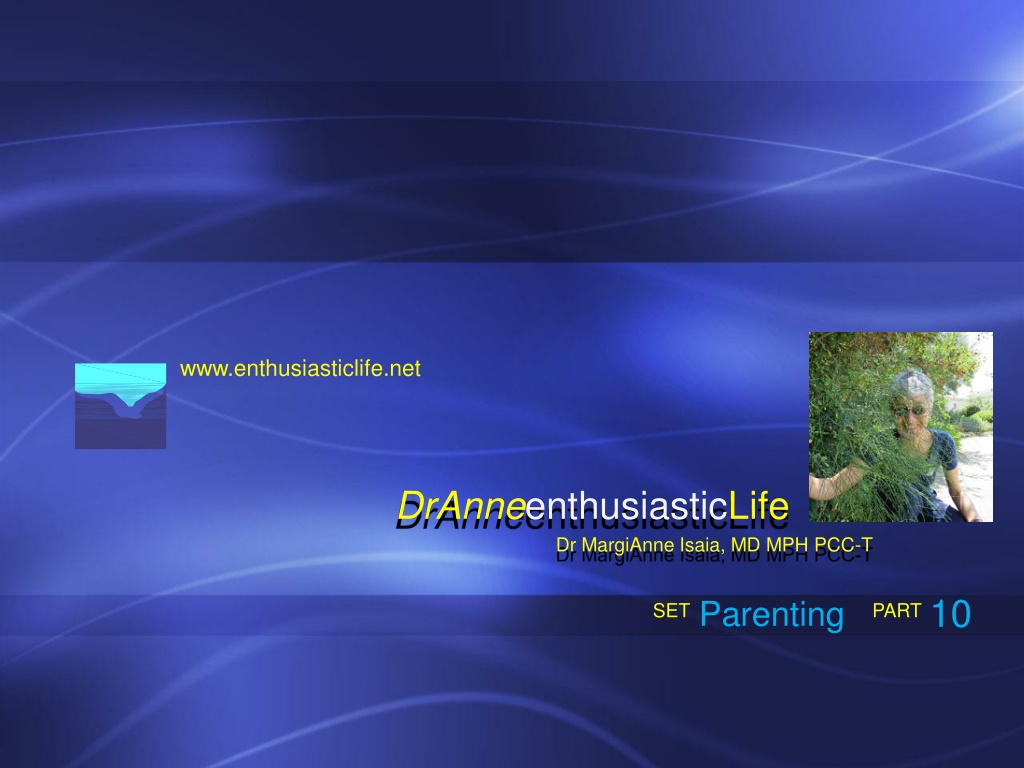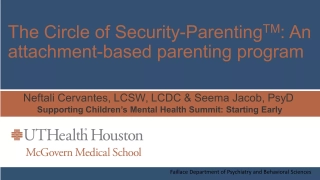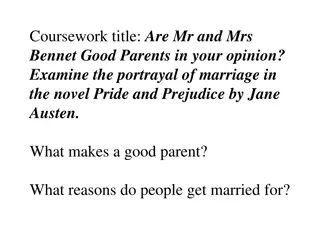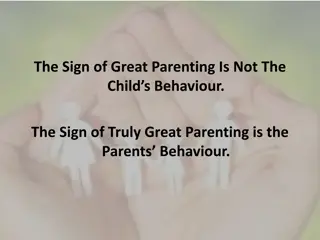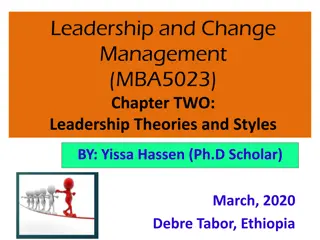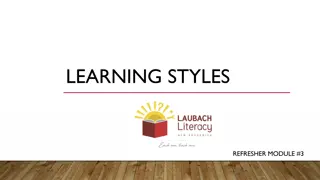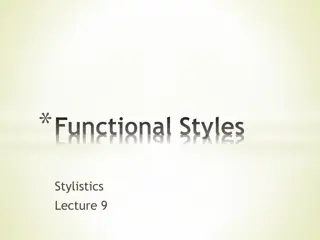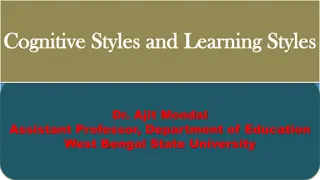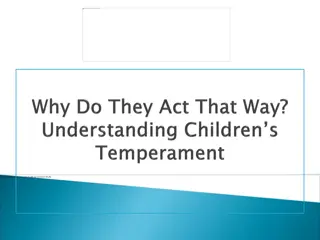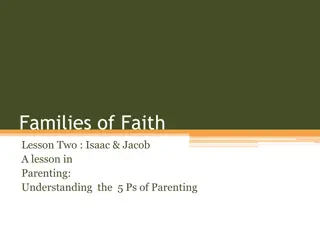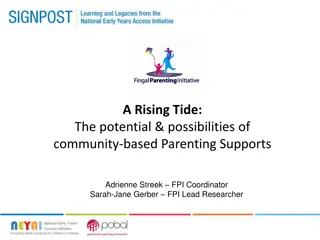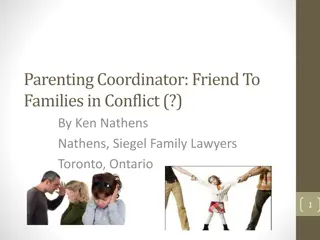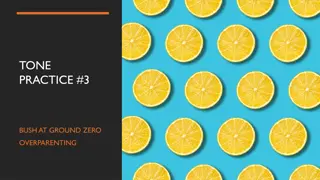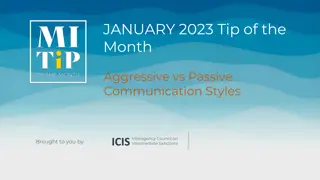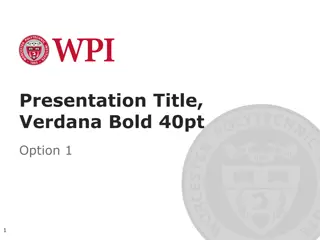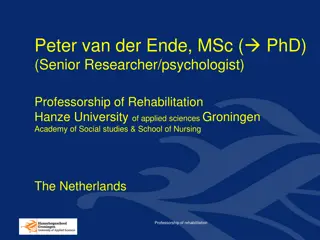Different Parenting Styles and Strategies
Explore the concepts of parenting styles, from authoritarian to permissive, and the impact they have on children's development. Learn about Dr. MargiAnne Isaia's insights on cultivating intellect in mothers for the sake of their children. Discover the importance of parental behavior in shaping children's instrumental competence.
Download Presentation

Please find below an Image/Link to download the presentation.
The content on the website is provided AS IS for your information and personal use only. It may not be sold, licensed, or shared on other websites without obtaining consent from the author.If you encounter any issues during the download, it is possible that the publisher has removed the file from their server.
You are allowed to download the files provided on this website for personal or commercial use, subject to the condition that they are used lawfully. All files are the property of their respective owners.
The content on the website is provided AS IS for your information and personal use only. It may not be sold, licensed, or shared on other websites without obtaining consent from the author.
E N D
Presentation Transcript
www.enthusiasticlife.net DrAnneenthusiasticLife Dr MargiAnne Isaia, MD MPH PCC-T 10 Parenting SET PART
PARENTING STYLE Represents standard strategies that parents use in their child rearing; Evolves over time as the children develop their own personalities moving through life's stages; Is affected by both the parents' and children's temperaments; Is largely based on the influence of one s own parents and culture.
Dr MargiAnne Isaia, MD MPH www.enthusiasticlife.net CLASIC QUOTATIONS For the sake of their children, if for no other reason, mothers should cultivate their intellects, for they bear a greater responsibility in their work than does the king upon his throne. Few mothers feel the weight of the trust that is given them, or realize the efficiency they can attain for their peculiar work through patient, thorough effort in self-culture . EGW - CG 71.2 More than human wisdom is needed by parents at every step, that they may understand how best to educate their children for a useful, happy life here, and for higher service and greater joy hereafter . EGW - CG 21.3
3 PARENTING STYLES /Diana Baumrind/ AUTHORITARIAN (parents telling their children exactly what to do); PERMISSIVE/INDULGENT (parents allowing their children to do whatever they wish); AUTHORITATIVE (parents providing rules and guidance without being overbearing); The fourth style was added lately NEGLIGENT (parents disregarding the children, and focusing on other interests).
Diana Baumrind has interest in the connection between the parental behavior and the development of instrumental competence (the ability to manipulate the enviornment to achieve ones goals). PARENTING STYLES The four basic elements could help shape successful parenting: RESPONSIVENESS DEMANDING vs. vs. UN-RESPONSIVENESS; UN-DEMANDING. Parents should develop rules for their children and be affectionate with them. These parenting styles are meant to describe normal variations in parenting, not deviant parenting, such as might be observed in abusive homes.[ Most parents do not fall neatly in one category, but fall somewhere in the middle, showing characteristics of more than one style.
AUTHORITATIVE PARENTING The parent is demanding and responsive.. called, also, 'assertive democratic or 'balanced' parenting; Is characterized by a child-centered approach that holds high expectations of maturity.
AUTHORITATIVE PARENTS Can understand how their children are feeling and teach them how to regulate their feelings; Help their children to find appropriate outlets to solve problems; Encourage children to be independent but still places controls and limits on their actions; - try to be warm and nurturant toward the child; - are not usually as controlling as authoritarian parents, allowing the child to explore more freely, thus having them make their own decisions based upon their own reasoning.;
AUTORITATIVE PARENTS Will set clear standards for their children, monitor the limits that they set, and also allow children to develop autonomy; Expect mature, independent, and age-appropriate behavior of children; Set limits and demand maturity, but when punishing a child, the parent will explain his or her motive for their punishment. Discipline for misbehavior are measured and consistent, not arbitrary or violent; Are attentive to their children s needs and concerns, and will typically forgive and teach instead of punishing if a child falls short.
AUTORITATIVE PARENTING Outcomes = children having a higher self esteem and independence This is the most recommended style of parenting by child-rearing experts.
AUTHORITARIAN PARENTING The parent is demanding but not responsive. called, also, totalitarian parenting or strict parenting, Is characterized by high expectations of conformity and compliance to parental rules and directions, with little open dialogue between parent and child; Is a restrictive, punitive parenting style.
AUTHORITARIAN PARENTS Expect much of their child, but do not explain the reasoning for the rules or boundaries; Are less responsive to their children s needs; Demand obedience without explanation and focus on status.
AUTHORITARIAN PARENTS Outcomes = Children may have less social competence In some cultures and ethnic groups (Asian) more positive child outcomes If the demands are pushed too forcefully upon the child, the child may break down, rebel, or run away, even lead to suicidal thoughts.
PERMISSIVE / INDULGENT PARENTING The parent is responsive but not demanding. - called, also, permissive, nondirective or lenient; Is characterized as having few behavioral expectations for the child.
PERMISSIVE / INDULGENT PARENTS Are nurturing and accepting, and are very responsive to the child's needs and wishes; Do not require children to regulate themselves or behave appropriately.
PERMISSIVE / INDULGENT PARENTING Outcomes = Children of permissive parents may tend to be more impulsive, and as adolescents, may engage more in misconduct, and in drug use. Also, in the better cases they are emotionally secure, independent and are willing to learn and accept defeat. They mature quickly and are able to live life without the help of someone else.
NEGLECTFUL PARENTING The parent is neither demanding nor responsive. is also called uninvolved, detached, dismissive or hands-off Neglectful parenting results from a variety of reasons: the parent's prioritizing themselves, lack of encouragement on the parent's parts, financial stresses, lack of support and addiction to harmful substances.
NEGLECTFUL PARENTS Are low in warmth and control, are generally not involved in their child's life; Are disengaged, undemanding, low in responsiveness, and do not set limits; Are dismissing the children's emotions and opinions; Are emotionally unsupportive of their children, but will still provide their basic needs;
NEGLECTFUL PARENTING Outcomes = Children develop the sense that other aspects of the parents lives are more important than they are. Children often attempt to provide for themselves or halt depending on the parent to get a feeling of being independent and mature beyond their years. They become emotionally withdrawn from social situations (disturbed attachment) and this impacts relationships later on in life. In adolescence, they may show patterns of truancy and delinquency.
PARENTING STYLES Study on adolescents, aged 14 - 18 in four areas: psychosocial development, school achievement, internalized distress, and problem behaviour Conclusion: while those with authoritative parents scored the highest those with neglectful parents scored the lowest on these tests,
OTHER PARENTING STYLES Family life is our first school for emotional learning (Daniel Goleman). Parents are the first teachers who teach their children about emotional intelligence: some parents are gifted emotional teachers, others atrocious (Daniel Goleman). According to emotional intelligence concept introduced by Daniel Goleman, John Gottman describes parenting styles using parents capabilities to help their children regulate their emotions and desires, to motivate themselves, to be sensitive to others needs and be able to cope with life s stress.
OTHER PARENTING STYLES (Gottman) The key element in parenting is how parents help their children develop emotional intelligence. Emotion Coaching The parent acts like an athletic coach (emotion coaching) Children learn to adjust appropriately in life s situations, have good manners, are able to identify, evaluate and express properly their emotions
OTHER PARENTING STYLES Emotion Coach According to Gottman, the parent who has the attitude of the emotion coach for the child will raise an emotionally intelligent child. This process takes place in five stages. Parents: 1. Are aware of the child s emotions 2. Recognize the emotion as an opportunity for intimacy and reaching 3. Listen empathetically and validate the child s feelings 4. Help the child verbally label emotions 5. Set limits while helping the child problem-solve.
OTHER PARENTING STYLES (Gottman) Dismissing parents These parents disregard, ignore, or trivialize children s negative emotions Disapproving parents These parents are critical of their children s displays of negative feelings and may reprimand or punish them for emotional expression Laissez-Faire parents These parents accept their children s emotions and empathize with them, but fail to offer guidance or set limits on their children s behavior.
PARENTING MODELS Demanding parents These parents have an authoritarian style and use guilt for manipulating their children s emotions. Children are treated as if they are totally helpless and must depend on their parents. Children become helpless and are in great need of their parents approval. Critical parents These parents interact with children by criticizing and being judgmental as a means of controlling them. In these families children maintain a high degree of family secrecy. Children suffer from low levels of personal esteem. Overfunctioning parents These parents feel overly responsible for a child s actions and manage almost every aspect of child s life. Parents over functioning behavior could arise out of a deep fear of being abandoned.
PARENTING MODELS Ineffective parents These parents are alcohol or drug addicts or have other chronic diseases. Children assume roles far beyond their abilities. Abusive parents These parents harm children physically, emotionally or sexually. In all of these cases child s emotional development will be significantly affected.
References Bigner, J.J. & Gerhardt, C., (2014). Parent-child relations: An introduction to parenting Gottman, J., (1997). Raising an emotionally inteligent child, The heart of parenting
